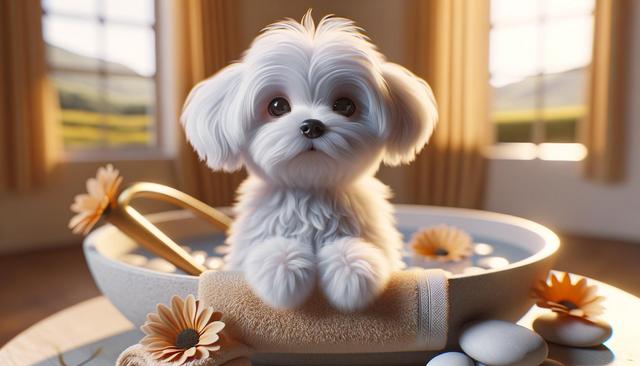History and Origin of the Maltese Breed
The Maltese breed has a history that stretches back thousands of years, with origins believed to trace to the Mediterranean island of Malta. These small companion dogs have been mentioned in ancient Greek and Roman literature and were often depicted in artwork of the time. The Maltese were prized by aristocrats and royals alike for their elegance and affectionate temperament. Over the centuries, selective breeding helped refine their trademark features: a flowing white coat, compact size, and expressive dark eyes.
Despite their long history, Maltese puppies have maintained many of their original traits. They continue to be known for their lively personality and loving demeanor. Their historical role as lap dogs has made them highly attuned to human companionship, which remains a defining characteristic of the breed today.
Physical Characteristics and Grooming Needs
Maltese puppies are instantly recognizable due to their long, silky white fur and petite build. As toy breed dogs, they usually weigh under seven pounds when fully grown. Their coat is one of their most striking features, but it also requires consistent grooming to maintain its condition. Without proper care, their hair can become tangled or matted, which may lead to discomfort or skin issues.
Key grooming practices for Maltese puppies include:
- Daily brushing to prevent tangles
- Regular baths using gentle dog shampoo
- Trimming around the eyes and paws for hygiene
- Routine ear cleaning to prevent infections
Some owners opt for a shorter “puppy cut” to make grooming more manageable. Regardless of haircut style, maintaining the coat is essential to keep your Maltese healthy and comfortable.
Temperament and Social Behavior
Maltese puppies are renowned for their affectionate and sociable nature. They tend to form strong bonds with their owners and often seek close physical contact. While they are alert and can make good watchdogs, they are not typically aggressive. This makes them suitable for families, singles, and seniors alike.
Socialization is important for Maltese puppies, as their small size can make them wary around larger dogs or unfamiliar environments. Introducing them gradually to various people, pets, and settings can help nurture a confident and well-adjusted adult dog. Common temperament traits include:
- Playful and energetic
- Highly affectionate
- Responsive to training
- Occasionally vocal when excited or alert
They thrive on attention and may not do well when left alone for extended periods, so prospective owners should consider their lifestyle when choosing a Maltese puppy.
Training and Exercise Requirements
Although Maltese puppies are small, they are intelligent and eager to learn. Training can begin as early as 8 weeks of age, focusing on basic commands and housebreaking. Positive reinforcement methods, such as treats and praise, are especially effective with this breed. Early training helps prevent the development of undesirable behaviors such as excessive barking or separation anxiety.
In terms of exercise, Maltese puppies have moderate energy levels. They enjoy short walks and indoor play sessions, which are typically sufficient to meet their physical needs. Some enjoy activities like agility or obedience training, which also offer mental stimulation. Key aspects of training and exercise include:
- Short, consistent training sessions
- Daily walks of 15 to 30 minutes
- Supervised playtime to prevent injury
- Using patience and gentle techniques
Maintaining a routine can be very beneficial, as it helps the puppy feel secure and understand expectations.
Considerations Before Bringing a Maltese Puppy Home
Before deciding to bring a Maltese puppy into your home, it’s essential to consider their specific needs and whether they align with your lifestyle. While they adapt well to apartment living due to their size, they require a considerable amount of human interaction and grooming care. Their sensitivity to rough handling also makes them more suitable for households with older children who understand how to treat small dogs gently.
Other considerations include:
- Time commitment for daily grooming
- Regular veterinary visits and vaccinations
- Initial training and socialization efforts
- Choosing a reputable and ethical breeder or adoption organization
Prospective owners should also budget for quality food, grooming tools, and occasional professional grooming services. With thoughtful preparation and the right level of care, a Maltese puppy can become a cherished member of your household, offering years of companionship and joy.
Conclusion: A Loyal and Loving Companion
Maltese puppies are a delightful choice for individuals or families seeking a loving, intelligent, and visually appealing companion. Their long history as cherished lap dogs is reflected in their deep bond with humans and their desire to be included in daily life. While they do require commitment in terms of grooming and attention, many owners find the relationship with a Maltese to be deeply rewarding. With proper care, training, and affection, these small dogs can live long, happy lives as loyal members of the family.




Leave a Reply